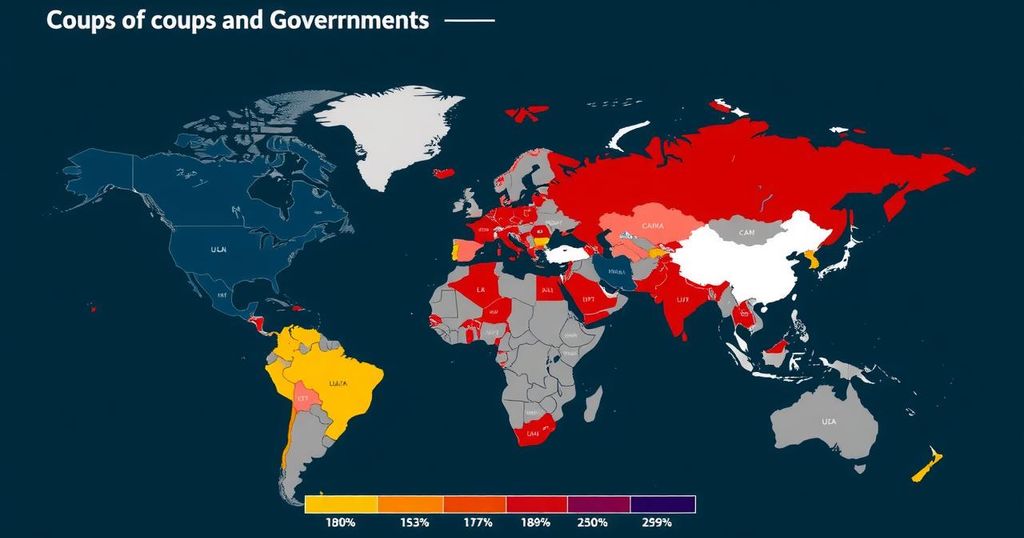In 2024, multiple countries experienced failed coups, resulting in severe turmoil and humanitarian crises. Notably, Bangladesh’s protests led to the ousting of Prime Minister Sheikh Hasina but sparked violence against minorities. Syria saw rebels seizing Aleppo, and Myanmar faced continued conflict post-coup. Haiti’s gang control worsened its instability, highlighting the need for international intervention in these crises.
In 2024, numerous nations experienced significant political turmoil, exposing the fragility of their respective governments. Notable instances of attempted regime change unfolded in Bangladesh, Syria, Myanmar, Haiti, and other regions, resulting in widespread unrest. Despite claims of peaceful transitions by the rebels, the humanitarian crises persisted, leading to violence and persecution of minority groups in various countries.
In Bangladesh, mass student protests against Prime Minister Sheikh Hasina spiraled into violence, claiming over 700 lives. The turmoil enabled a change in leadership, with Nobel laureate Muhammad Yunus assuming control. However, ongoing attacks by Islamist extremists against minorities raised tensions, further complicating the country’s situation and negatively impacting its relations with India.
Syria encountered renewed offensives as Islamist groups seized control of significant territories, including Aleppo, from government forces. Despite the government’s ongoing military support from Russia and Iran, the resurgence of rebel factions raised concerns about a prolonged conflict with devastating humanitarian outcomes.
Myanmar continued to face severe unrest following the military coup in 2021. The clash between the junta and rebel forces has resulted in approximately 5,300 fatalities and millions displaced, while some factions tentatively seek peace talks mediated by China.
Haiti’s situation reached new depths with armed groups dominating Port-au-Prince amid unsuccessful foreign intervention aimed at stabilizing the region. The violence resulted in tens of thousands fleeing their homes as gang-related killings surged perilously over 4,500.
Further complicating the geopolitical landscape, Sudan and the Democratic Republic of Congo have seen increasing violence driven by persistent rebel conflicts, exacerbating humanitarian crises in the region.
The situations in these countries underscore the interlinked nature of political instability, humanitarian disasters, and the pressing need for international intervention to restore peace and security.
The year 2024 witnessed a series of political upheavals across various nations, where efforts to unseat established governments led to widespread violence and societal unrest. The fragile nature of political institutions in countries such as Bangladesh, Syria, Myanmar, Haiti, and the Democratic Republic of Congo became evident, highlighting the risks associated with regime changes and the resultant humanitarian crises. The involvement of Islamist groups and rebel factions further complicated these situations, creating dangerous rifts within societies and leading to targeted attacks against minority populations, often in the wake of governmental changes. The ripple effects of these conflicts not only disrupted domestic stability but also strained relations with neighboring states.
In summary, the events of 2024 illustrate a concerning trend of governmental instability driven by coups and armed conflicts across multiple nations. The fallout from these upheavals has resulted in significant loss of life, widespread violence, and a deteriorating humanitarian situation for millions. Notably, the plight of minority groups amid these transitions underscores the need for vigilant international support and intervention to address the ongoing crises and promote stability in these volatile regions.
Original Source: www.news18.com







